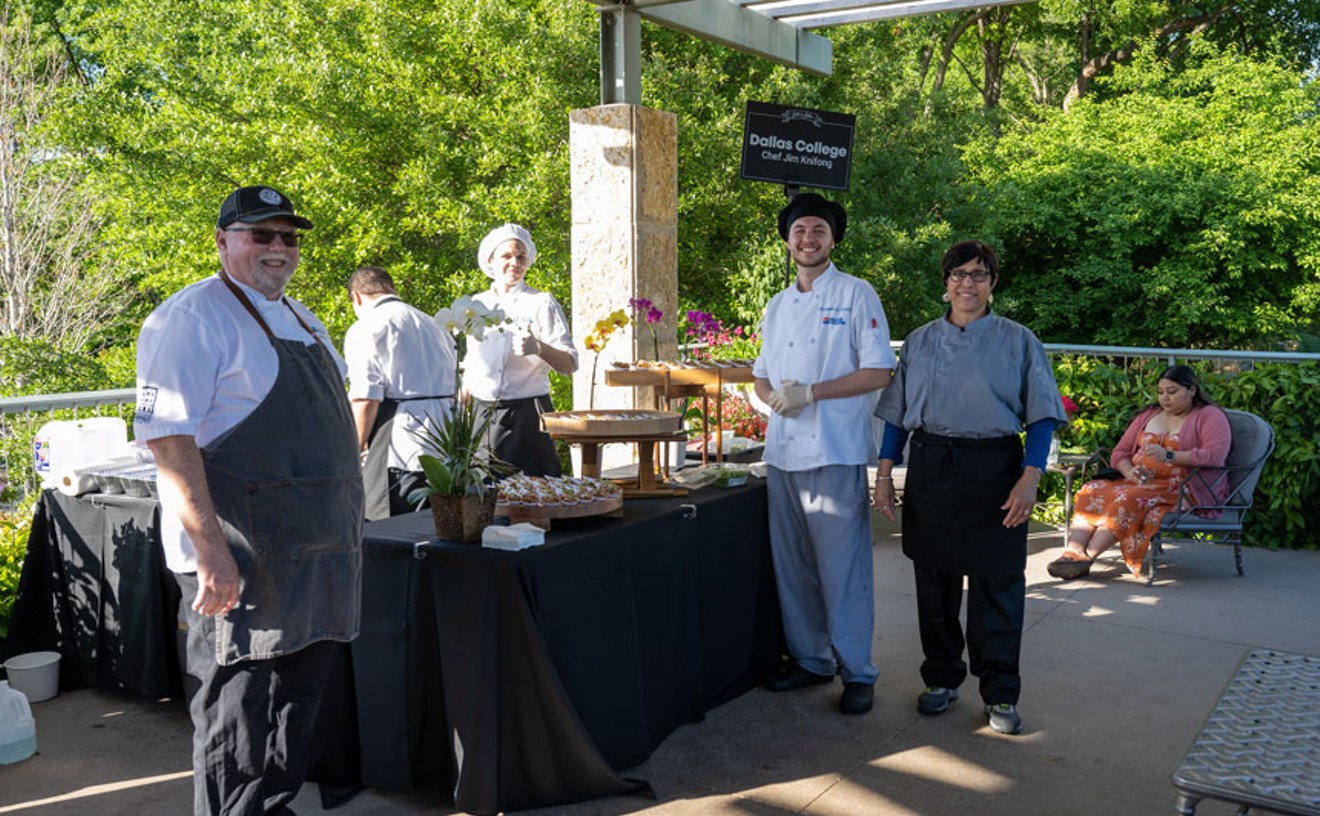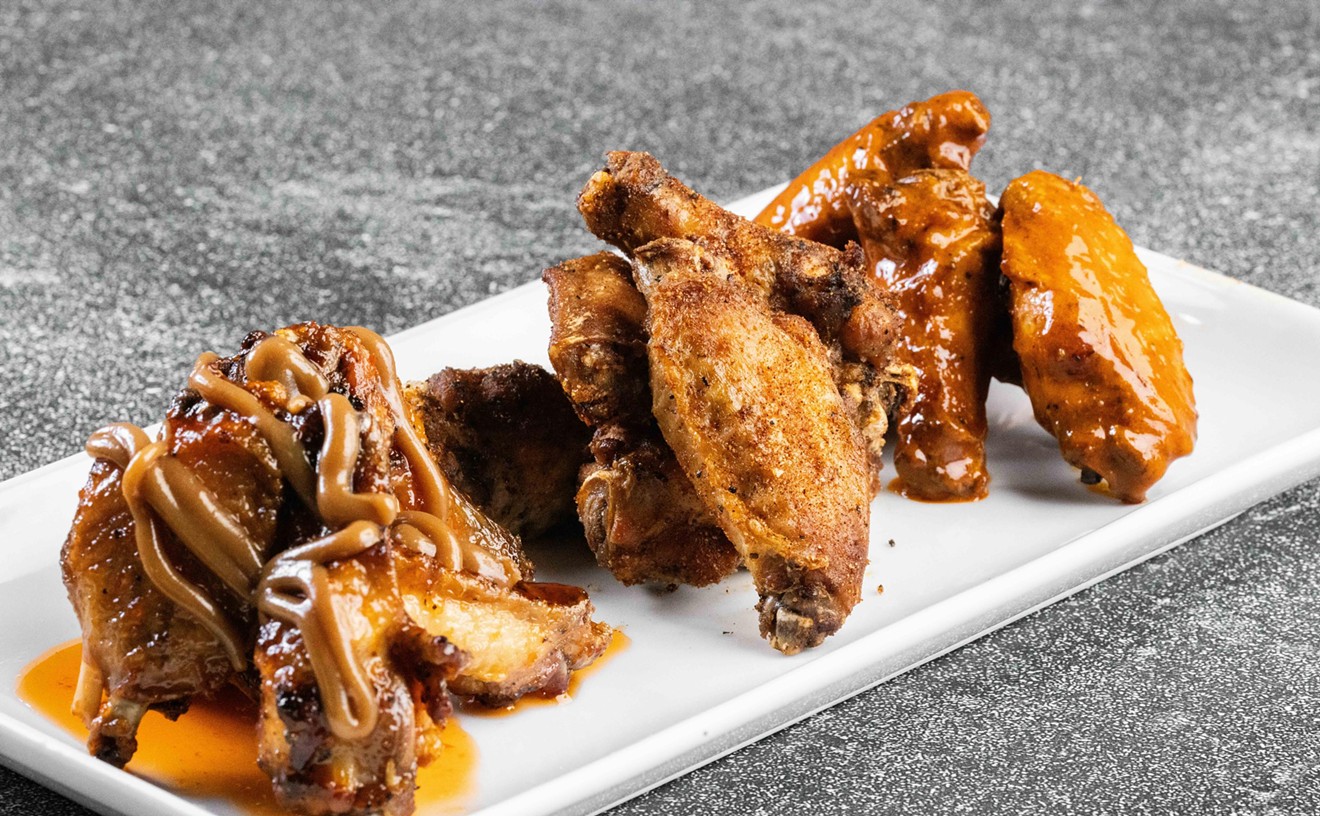Just a year ago, a drive down Henderson Avenue in East Dallas was a depressing trek through a graveyard littered with the ghosts of restaurants past. Even the most accomplished restaurateurs (including James Beard nominee Nick Badovinus) have tried and failed to sustain a successful business in this seemingly prime location.
Since December, Chef Stephen Rogers and his wife, Allison Yoder, have been breathing a large dose of fresh, California air into one of the city's most "doomed" locations for a fine dining restaurant. I sat down with Rogers to talk about Gemma, his food, and why the hell he decided to bring his laid-back brand of coastal cool to North Texas.
Just a few years ago, you were living and working in Napa with your wife. What was the impetus for you to move to Dallas and open a restaurant? It is a crazy idea. It's something that we'd talked about for a long time, and we'd always had the dream of wanting to open our own place. In December 2012, we finally decided to come here and open Gemma.
Was that a business decision, something you liked about the market here, or was it more personal? Basically, we chose Dallas because I'm from here. I grew up in University Park. We have 2 3-year old boys, and family was a big part of that. We were living in Napa at the time, thought about doing a restaurant in Napa, but it just seemed right to do it in Dallas.
Has it been difficult or interesting to run a restaurant as a husband and wife team? You know, we've worked together on and off in restaurants for a long time. With Allison in the front of the house and me in the back, there's not a whole lot of butting up into each other during service. Some days, we'll go the whole shift without even seeing each other. But she's got a great palate and a sharp eye for the details in both the front and back of the house. We both have good criticism for each other. Because we are husband and wife we don't get too sensitive about it, so it's easier to change things.
Gemma is a relatively unknown quantity. It's not a restaurant from a chef like Tesar or someone's been in the city for a long time. In your own words, what is Gemma all about? In a word, it's comfort food. We're basically a bistro here. I wanted to be very vegetable friendly, I wanted it to be healthy, not a ton of cream and butter. We use butter but sparingly, and try to cook really friendly with vegetables. We bake our bread in house, make our own pastas. Probably 90% of our menu is naturally gluten-free.
Where does the name Gemma come from? Does it hold any special meaning for you? We wanted one word, something that was easy to say but unique at the same time. We did a lot of thinking, and we just liked the name Gemma and what it meant. In Italian, "gemma" means "little gem." In Latin, it means a tiny bud of a plant. It worked for what we were trying to do.
What about the aesthetic in here? Gemma has a very specific look and feel. What were you going for? The space kind of created itself, really. When we came in, we saw the beadboard that had already been installed and it immediately made us think of the Hamptons look. That look combines old with new - it's not distinctly modern, it's not distinctly rustic. It's meant to be kind of comfortable and inviting. If we had opened a restaurant 10 years ago, we probably would have gone with a more modern look because it was more unique then. Hamptons isn't something you see a lot of in Texas.
What is your culinary training background? Did you go to school? Work for anyone famous? I did not go to culinary school. I actually went to school for music, but I'm obviously not using it. The first famous chef I worked for was Tom Valenti in New York. I was a waiter in one of his restaurants, and I told him I wanted to get back in the kitchen. That actually didn't pan out and I ended up moving away from New York, but I kept working in restaurants as a manager. When we made the move to California, I finally decided that I wanted to get in the kitchen. I was 36.
It seems like that's pretty common - a lot of the "new crop" of great chefs doesn't feel compelled to go to culinary school or take the traditional route. Why do you think that is? I think it has to do with the fact that most of your schooling in this business comes from actually working in a restaurant. You can go to school and learn a lot, but a lot of young people who go to culinary school end up doing something else. A lot of culinary students find out that they don't like the restaurant business very much. It's a rude awakening - working long hours, and most jobs don't pay very well.
Many of the city's most popular restaurants are at their core very similar - New American cooking with heavy Southern influences. Coming back here, did you feel pressure to incorporate some of those techniques and tastes into your own cooking? Nope, not at all. Aside from really loving okra, and maybe jalapenos - you will probably start to see some spicier dishes on the menu - but I don't have an overly southern or Texas twist on my cooking. There's a lot of places you can go have that, so why would I do it here?
So what does Gemma bring to the table that's so fundamentally different? Our focus on seasonality. We're cooking with the vegetables and fruits that are in season, and we want all of those fresh foods on the menu. When you go shop at Whole Foods, there's a whole variety of vegetables that are available in winter, but you don't see that in restaurants. You don't see celery root, you don't see sunchokes.
Are you having any difficulty sourcing the produce that you want to use in the menu? We were very spoiled in California. There were a lot of local farms that were within 60 or 90 miles of Napa that would deliver awesome organic produce, and it's much harder to find in Dallas. There's a good network out there, and you can special-order anything you want now. The farms here are smaller operations, and I'm kind of a newbie to Dallas. It takes a while to get in with them, get them planting stuff for you.
On a less positive note, this part of town, particularly this part of Henderson Ave, has seen a lot of restaurants close their doors very quickly after opening. Did that scare you when you decided to build Gemma in this location? Of course it did. I did a lot of research on what was here before and tried to figure out why a restaurant hadn't been successful. Now, I believe that this area has changed a little bit, especially as the "good" real estate in Dallas is rapidly disappearing. This strip on Henderson is so centrally located when you think about it - Highland Park, University Park, Lakewood, Downtown are all just a stone's throw away. Then there's all these new apartments being built in Uptown. The beginnings of change were already happening when we got here, but maybe the restaurants before were here too early. It was a gamble, though, coming here. A lot of people said that we were out of our minds.
There is a lot of seafood on the menu. Do you think chefs shy away from seafood because preparation and sourcing are more difficult? Or does it not sell as well as the chicken, steak, or pork? The distribution of seafood in Dallas, especially for higher-end restaurants, isn't where it should be. All of the chefs at fine dining restaurants here are flying things in from the coasts. When you live on a coast, the distribution network for restaurants is much larger, and it's much easier to get.
Do you have any plans to put interesting seafood on the menu? Maybe some species that we haven't seen a lot of? We try to just pay attention to sustainable seafood and so it kind of shrinks the available choices.
So no Chilean sea bass or bluefin tuna on the menu here? Nope.
Was that a big part of your initial overall vision for the restaurant, sustainability? Definitely. In California, I was exposed to so many different interesting vegetables from the farmers there. Because the market was so competitive, they had to be creative and find ways to make their money, and that meant using all parts of the plant. When they'd thin out the garlic plants, they'd harvest the green garlic and sell it to chefs. Or tender fava leaves. They found a market for parts of the plants we weren't used to eating. I wanted to incorporate that ingenuity.
How else are you making sustainability a priority? We use cloth napkins in the bathroom. We invested in a machine that provides purified still and sparkling water, so we don't use any bottled water in the restaurant. Think about all those bottles of Pellegrino that have to be produced, shipped all the way to the U.S. only to end up in a landfill. We wanted to avoid that. The tables in the restaurant were crafted from trees that were cut just down the street, in the area where The Rustic was being built. We've talked about a rooftop garden, and starting a composting system similar to what we had in Napa. We also have wine on tap.
Wine in a keg? Is that like a barrel? I don't think I've ever heard of wine in a keg. Is it easy to find good wine in a keg? It's just like beer. Each keg of wine holds at 25 bottles, so you're saving the glass, the labels, and the corks. A keg can be reused over and over again. Right now, there aren't a lot of great wines available in kegs, but there are some, and every day there's a new winery that's offering them.
So, after 3 months of being here and learning the area, any plans for major changes? No, nothing major. Just tweaking and always making what we do better. I think we've got a good thing going, and people seem to like it.










